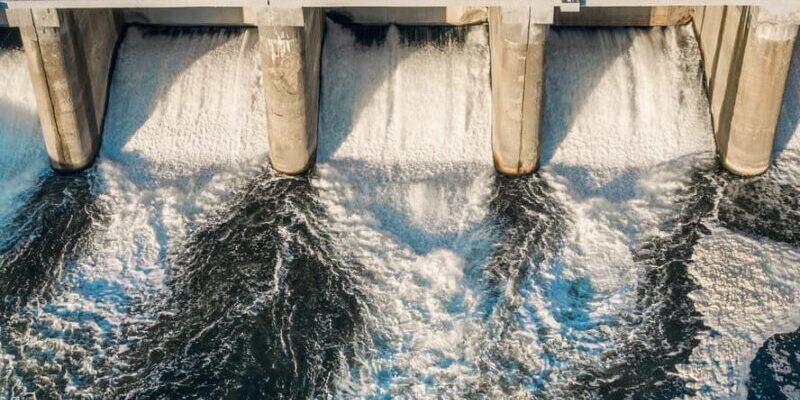Ethiopia’s Controversial New Hydroelectric Dam Has Neighbors On Edge
As the Grand Ethiopian Renaissance Dam nears completion, following years of delays and conflict over water security, Ethiopia is optimistic about what this means for the country’s energy sector. However, other countries, such as Egypt, are concerned about the effects the dam will have on its water supply.
With no agreement over the management of the dam having been reached, the project could have a dramatic effect on the region’s energy and water security.
Ethiopia’s Office of National Coordination announced this month that its Grand Ethiopian Renaissance Dam (GERD) has reached 90 percent completion.
This follows years of delays due to complaints about the project from other countries situated on the Nile. The $4.2 billion GERD was announced in 2011, during Egypt’s social uprising. Construction first began 12 years ago but it is only over the last three years that progress has been made on the project.
GERD is seen as key to Ethiopia’s development and the supply of power to its population of over 110 million. And in February 2022, Ethiopia began producing its first electricity from the mega-dam, from one of the 13 turbines. GERD is expected to make Ethiopia a major power exporter in the region, producing an anticipated 6,500 MW.
According to Ethiopia’s media, it is expected to be the largest hydroelectric power generator in Africa and the world’s seventh-largest dam. The structure stands at 145 metres, with a total reservoir capacity of 74 billion cubic metres. The filling of the reservoir first commenced in 2020, reaching its goal of 4.9 billion cubic metres, with a further 13.5 billion cubic metres added in 2021.
But Egypt is concerned about what the project means for its water supply. The two countries have been in discussions for years over how the dam will be managed to ensure that it does not restrict the Nile’s water supply to other countries with no solid resolution. Egypt relies on the Nile for 90 percent of its fresh water and has long shaped its identity around its situation on the Nile.
Egypt’s Minister of Water Resources and Irrigation, Hani Sewilam, has criticised Ethiopia for failing to cooperate effectively at the regional level on decisions about the dam. Sewilam suggested that Ethiopia is disregarding the needs of neighbouring countries, and emphasised the economic, social, and environmental dangers of unilateral moves on common river basins.
Meanwhile, Sudan, another downstream country, hopes the project will be to its benefit, reducing annual flooding in the region. However, it shares Egypt’s concerns about the water supply and worries GERD could be detrimental to its own dams unless a clear agreement is reached with Ethiopia.
The Nile Basin River flows through 11 countries, with the Blue Nile and White Nile merging in Sudan and then moving through Egypt to reach the Mediterranean Sea. Egypt was provided with 55.5 billion cubic metres of water annually under a 1959 deal, with Sudan getting 18.5 billion cubic metres. However, Ethiopia does not recognise this agreement, which provides no allocations to other countries in the basin.
Egypt and Sudan are concerned about the management of GERD and believe that filling and replenishing the dam too quickly could restrict how much water it would release downstream if there was a multi-year drought.
The Egyptian Foreign Minister Sameh Shoukry stated at the latest session of the Council of Arab Foreign Ministers that GERD could pose a great danger to Egypt, “which suffers from unique water scarcity as the driest country in the world.” Shoukry went on to ask Egypt’s allies “to force Ethiopia to abandon its unilateral, non-cooperative practice,” and to show the “necessary political will to adopt any of the compromise solutions that were proposed at the negotiating table, and that proved to fully achieve Ethiopia’s economic interests without prejudice to the destinies of the peoples of the downstream countries.”
The main problem is that both Egypt and Ethiopia view the use of the Nile’s waters as a matter of existential necessity and an existential threat. Egypt relies on the Nile for its water supply and economic stability, meanwhile, Ethiopia believes the dam will provide clean energy for its growing population and spur economic development.
With climate change threatening the world’s water supply, as well as causing international powers to push for a green transition, the two countries are at an impasse.
Over the years, the countries involved have sought external input on the project to help protect their water and energy security. Egypt raised the GERD conflict in the UN Security Council in 2020. And some Arab nations are supporting Egypt’s position, suggesting that the dam poses a threat to the Arab water supply. Meanwhile, some African powers view the development as supporting Africa’s green transition, with the potential to transform the region’s power supply.
With such longstanding historical ties with the Nile and the ongoing reliance on its waters for water and energy security, it will be no easy feat for Ethiopia, Egypt, and Sudan to reach an agreement on the management of GERD.
There will likely be sacrifices and compromises required as the dam comes into operation. However, a deal must be struck between the Nile countries to ensure the maintenance of regional security in the face of climate change.
85 total views , 1 views today





